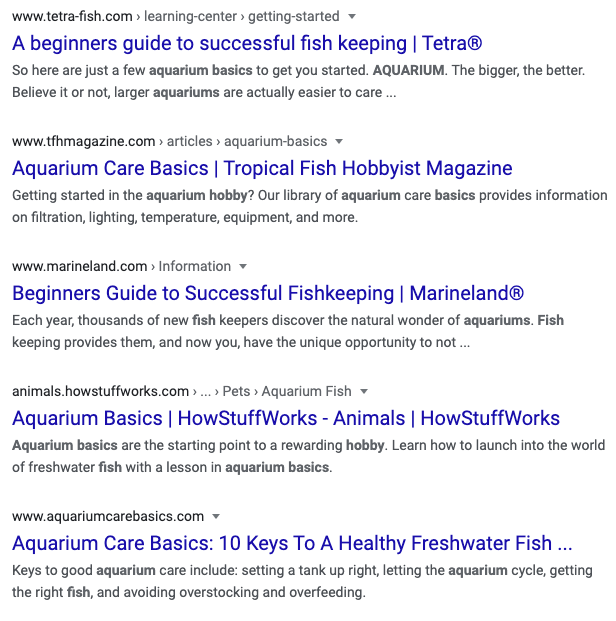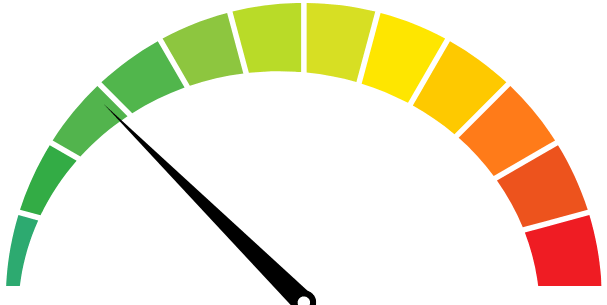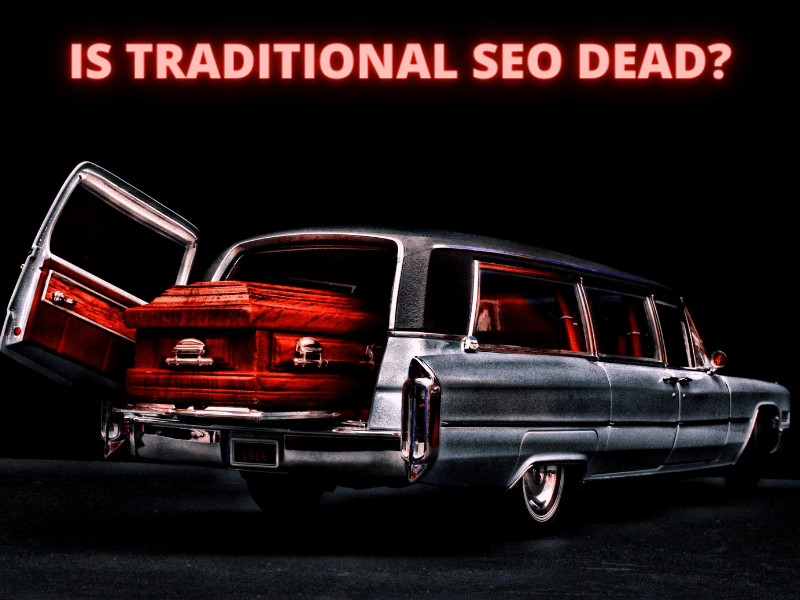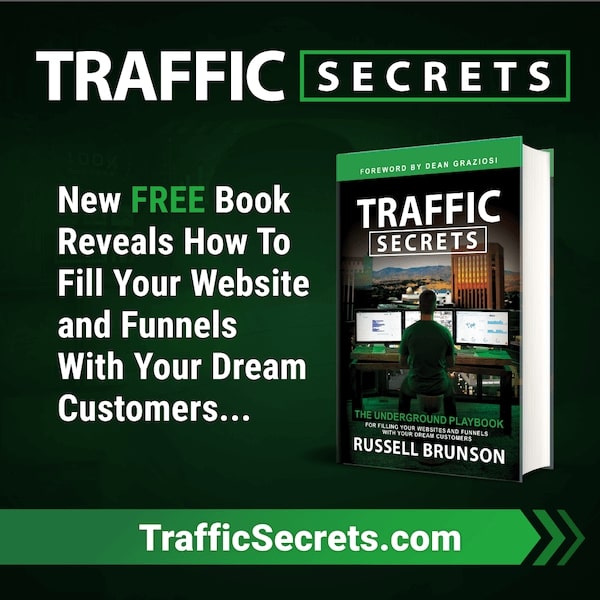Is SEO Dead for Online Marketing
Every few years, you hear the marketing world whisper - SEO is dead !! Its gone !! There is no scope of SEO anymore!. This topic has been in hot waters from last 15-20 years but is 2024/25 the year in which we can finally pin the death of SEO?
Before we discuss the death of SEO in detail, Its important to understand why the topic of SEO is so sensitive and why its prevalence is so important.
In 2020 a whooping $65.26 Billion dollars were spent by companies on SEO tactics. This number swelled up to $72 Billion in 2018 and by 2025 its estimated that companies will spend about 85 Billion on Search Engine Optimization alone.
So what does this translate to in terms of your marketing strategies?
Let’s just say that your online success is only as good as how you rank on Google.
Google accounts for nearly 94% of the global search engine traffic.
In total about 2.3 trillion searches happen on Google any given day of which 15% are new searches. With so much being held on the importance of SEO into driving user experience, Google changes its search engine algorithm almost constantly. In fact in the year 2017 alone, google made a staggering 2,453 changes to its algorithm and in 2018 it made 3,234 improvements.
Now, let’s say you have the good fortune of owing a website, that has a keyword, for which it ranks in top 5 of the SERP results. This means that your website has the potential to gather 67.60% of all clicks directly from the search result on those keywords - i.e. Organic Traffic.
Studies show that 51% of all website traffic comes from organic search and that it accounts for almost 40% of revenues generated through online sales. Considering that 40% is a size-able chunk of revenue for any business, if SEO dies, there is a lot of money that it will be taking with it to the grave.
If something were to change in the Google algorithm which contradicts with the way your content is structured, and now the 40% of revenue starts getting channeled to the some other company, what’s the first thing which would come to your mind?
Maybe claim that SEO is dead. Or may be start putting tons of money in paid traffic in hopes of driving your rankings up again.
Taking all of this into account, I think we can answer the question - Is SEO Dead ?
No!
In fact its alive and kicking. Whats actually more accurate to say is that SEO is still evolving.
The Search engine optimization techniques have evolved dramatically in the last 10 years. While some ranking methods lost relevance, as technology evolved, other new methods came upfront to maximise user experience and highlight relevance.
The Death of Old SEO
There were some SEO methods which died a slow death. One of the prime examples of this would be when Phone apps were launched - predominantly when Apple released the iPhone.
The new genre of smart phones introduced apps. Today, there are so many things you can do with apps, that some industries suffered hugely because of this technological advancement. If we look a decade back, it was easy to rank for keywords such as “current weather” or “weather now”. Lack of smart phones and apps meant people typing this keyword on a search console to look for weather updates. But today all you have to do is to pull an app or use a widget on your phone and you have the details

So here - Apps killed the SEO around the keyword “current weather”
To give perspective to the weather example, the word “weather” used to have a click-through rate of 46% sometime in 2015. Today, its click-through rate is only 7%.
Another example of a SEO death would be keyword spamming or density.
For a long time, SEO was just about keywords. The top results in SERPs were littered with spamming sites like “BestPetShopUtahe.com.” Pages like this would often surpass the reputed domains (like Pet Planet) or other more specific ones. The spammy websites would focus on a low competition, high volume keyword and litter their website with it resulting in a higher ranking since Google Algorithm would only look for keyword density.
Deciding it was enough, Google released an update hitting the spammy exact match domain name sites.
Result? The SERP looks something like this when we search “Best Pet Shop Utah.”

No spam, just relevant results of the real Pet Shops. In this case Google SEO update killed the Spam websites.
Keywords in general are no longer as relevant today as they used to be. Today, you can use long-tail keywords, and your website may still not rank.
SEO as we used to know it has evolved.
In the old method, the keyword selection would be emphasized to be selected using the below methodology:
- Use long-tail keywords
- Use keywords that have high search volume
- Use keywords with low competition
Then the keyword structure would need to be structured as below:
- Put your keyword in your title
- Put your keyword in your H1 heading
- Put your keyword in your H2 heading
- Put your keyword in the fist paragraph of your text body
- Put your keyword in the middle paragraphs
- Put your keyword in the last paragraph
This old method is no longer as potent as it used to be. What this means is while these principles must still be applied, they will not take your blog page to the top of the SERPs, unless you also use modern SEO methodologies.
The New Generation SEO
Today, Google has come a long way. It relies heavily on artificial intelligence and adapts / adjusts according to user behavior. The current ranking factors baked into google algorithms work with just one focus in mind - user experience. Google wants to retain the top spot as a search engine and hence its prime focus is to give a positive experience to its users.
What is a positive user experience?
When somebody launches Google search, that person has an intent—they are looking for the most relevant information about their search query.
So, if they type “basics of aquarium hobby,” their expectation is to read articles that teach them the basics of buying/ building and maintaining an aquarium.
A few years back, if someone wrote an article on “glass” and spammed it with the keyword “basics of aquarium hobby”, Google would pickup their website under SERP results. However feeding off a bad user experience, Google updated its algorithm and now focuses on the entire article, structure, and website theme in general to show results. Hence today, the same keyword, will get you the below result:

If you open each web page on this SERP, almost all articles will tell you what you need to know if you are starting an aquarium hobby.
The new breed of SEO is not just about keywords anymore, but is based on topic search and focuses heavily on user experience.
Here are some of things that you need to take into perspective:

Bounce Rate
When a user visits your web page and leaves immediately without checking out any other page, it is considered as a Bounce. High bounce rates tells Google that your readers are not interested to explore more. What you want is for people to read or visit at least two pages every time they go to our site.

Average Session Duration
This is the average time that users spend on your website. If User A spent 5 minutes, and User B spent 10 minutes, your average session duration is 5 + 10 = 15 / 2 = 7.5 minutes. The higher your Average Session Duration, the more Google will think that you are providing value to your users.

Pages per Session
This refers to the average number of pages your users visit for each session. The more pages they visit, the more Google would think that you are adding value.
At the end of the day, your ultimate quest should be to provide as much value to a reader as you can through your webpage. You should always strive to be an authority in your niche and provide more value than competition in order to gain SERP rankings.
Tips for effective SEO strategy
Listed below are some tips with how you can improve your SEO strategy. All these tips have something to do with value and not just the keyword aspect of your website.

1. Site Speed
Your page must load fast. Studies have shown that if your web page does not load in less than three seconds, your site visitor will lose interest. And if the visitor leaves , Google is going to log this as a Bounce. Also, since the site visitor did not even bother seeing your article, your average session duration and pages per session stats will get severely impacted.
How do you measure your site speed?
You can use tools like GTMetrix, or use Google Page Speed Insights. Once there, just type or paste your URL, and the results will show you your website speed, plus recommendations if any to increase it.
Click here for a detailed post on how you can increase your website speed.

2. Images and Videos
Try to use a balance of text and images on your website. Images and videos increase the appeal of your website and make people stay. Images further make your blog posts more credible. Users judge the website by the way its structured. Proper use of images and videos increases the credibility of your website.
Here are some examples:
- Images could be any pictures or screenshots. Try to use stock images. Check link here
- Infographics
- Artwork
- Step by step screenshot for tutorials
The longer the user stays on your website, the better Google would think of your page. If a user explores other pages one your website, your bounce rate will improve, your average session duration will be longer, and your pages per session will be higher. This will help your website rank high in relevancy under Google.

3. Backlinks
A backlink is a link from one website going to your website.
Backlinks are super important because in Google’s eyes, a backlink is an upvote. As a vote of confidence, it tells Google that other bloggers believe in your content. As such, Google is more likely to show your web page at the top of the SERPs.
Be cautious when doing this and avoid spammy backlinks such as black hat SEO where people buy and sell backlinks. This is an unethical practice and Google often penalizes websites that indulge in them.
While Google does not know if you bought a backlink, it can make assumptions that your backlinks may be bought because they are unnatural.
If you want to rank, you need to get backlinks the natural way.
So, how do you get backlinks?
Here are two recommendations:
- Guest post – you can reach out to other bloggers in your community, and then tell them that you will write an article which they can post on their blog. In that article, you can add a link back to your website. If this blog post gets traffic, its readers may click on the backlink you placed there, and you will also get traffic.
- Use forums – you can go to forum websites like Quora and Reddit, and then help people. If they like what you wrote, they will visit your profile and go to your website. You can also drop backlinks in your answers. However, you need to be careful when doing this. Many forum users hate marketers—they hate affiliate links and any kind of backlinks. Read the user manual and abide with their policies.
You can also join organizations like Backlink Society. It is a website where you can swap backlinks with legitimate websites, not spammy ones. All members there are carefully assessed by the founder. It is like a dating website, but for website owners.
If we had to summarize the new SEO algorithm, it would be - user experience. While using the right keywords is essential, your ultimate goal should be two-fold—serve the best interest of your target user and outshine your competition.
Conclusion: is SEO Dead?
Is SEO dead? No ! Far from it. SEO has evolved from it used to be 10 years back and is constantly evolving as we speak.
And SEO is not going away either. It is only going to get better and open tons of opportunities for marketers who grow and better themselves with it.
Approach SEO from the perspective of a user. See if you content truly adds value to the experience of anyone reading or watching it. Establish your Credibility and Authority and make SEO work for you rather you work for it.



